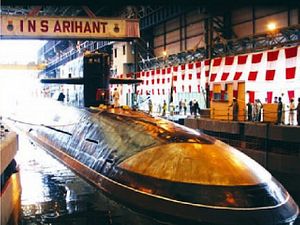The Indian Navy’s first indigenously developed ballistic missile nuclear submarine (SSBN), the INS Arihant, could be commissioned as early as next month, according to local media reports.
“It has passed all tests and in many things has surpassed our expectations. Technically the submarine can now be commissioned at any time,” a senior defense official told The Economic Times.
The submarine has undergone extensive deep sea diving drills and weapons launch tests. During the various tests, conducted in utmost secrecy off the coast of Vishakhapatnam, the boomer has been accompanied by a Russian submarine rescue ship of Russia’s Black Sea Fleet, the RFS Epron.
The Indian Navy currently does not possess a submarine rescue vessel and had to rely on Russian support to conduct the INS Arihant’s sea and weapons trials. The first missile tests aboard the SSBN were conducted in October 2015.
The submarine will be armed with the K-4, an intermediate-range nuclear-capable submarine-launched ballistic missile (SLBM) also under development by DRDO, with a rage of up to 3,500 kilometers, as well as with the K-15 Sagarika SLBMs with a 700-750 kilometers range.
Both missiles can be armed with nuclear warheads. The sub has four vertical launch tubes, which can be armed with either four K-4 missiles or 12—three per launch tube—K-15 missiles.
Another missile, the 1,000 km-range subsonic tactical cruise missile Nirbhay, has also been test-fired in October 2015 for use on the sub. However, the test has only been partially successful.
As I noted back in October 2015:
Should the Nirbhay not receive operational clearance soon, the INS Arihant will face limitations as integral part of India’s nuclear triad given the K-15’s limited range, which would mean that the submarine would have to move closer to enemy shores to launch its missiles, making it vulnerable to detection.
The Arihant is the lead vessel of the Indian Navy’s future fleet of four (some media reports say five) Arihant-class SSBNs. The shipyards at Vishakhapatnam have allegedly already started working on two more vessels of the class.
India’s new submarines are based on the Russian Project 971 Akula I-class nuclear-powered attack boats. The Arihant itself will be a technological demonstrator, rather than a fully operational SSBN.
As I reported before, India’s nuclear warfare policy is centered on a No First-Use (NFU) doctrine. As a result, New Delhi needs to field a credible second-strike capability. Yet, as of now, India keeps its nuclear warheads de-mated from the actual missiles. However, in order for the new sub class to fulfill its role as the sea leg of India’s nuclear triad, SLBMs with mounted nuclear warheads will need to be deployed on the boomers.
































